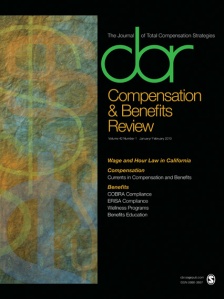How to Manage Salesforce Performance Measures? An Optimal Choice Between Behavior Versus Outcome Approaches
 [We’re pleased to welcome Pankaj M. Madhani of ICFAI Business School (IBS) in India. Dr. Madhani is the author of “Managing Salesforce Performance: Behavior Versus Outcome Measures” which appeared in the most recent issue of Compensation and Benefits Review.]
[We’re pleased to welcome Pankaj M. Madhani of ICFAI Business School (IBS) in India. Dr. Madhani is the author of “Managing Salesforce Performance: Behavior Versus Outcome Measures” which appeared in the most recent issue of Compensation and Benefits Review.]
As selling is an unique and independent occupation, effective management of salespeople plays a critical role in realizing their full potential and hence contributes immensely to the success of sales organization. Sales organizations have two main approaches for managing the behavior of their salesforce, namely, behavior-based (monitoring) and outcome-based (incentives). A behavior system evaluates the salesforce in light of the selling process, while an outcome system evaluates the salesforce in light of results. This research identifies key characteristics of behavior- and outcome-based systems along with its benefits and drawbacks and suggests selection criteria for appropriate choice of behavior versus outcome measures.
Behavior measures attempt to control the process of selling as opposed to just the outcomes while outcome measures focus on getting the results and are essentially indifferent to how those results are obtained. The study explains this behavior with the help of agency theory and highlights the underlying logic of short-term behavior of salespeople when compensated with incentives. Research also provides performance matrices for measurement and evaluation of financial impact of behavior and outcome control. The behavior-based and outcome-based control systems are at the extremes, and many sales organizations function in the middle, balancing the two. Finally, the study provides a numerical illustration to design an optimal performance measurement scenario based on behavior- and outcome-based measures.
You can read “Managing Salesforce Performance: Behavior Versus Outcome Measures” for free by clicking here. Want to know about all the latest research from Compensation and Benefits Review? Click here to sign up for e-alerts!
 Pankaj M. Madhani earned bachelor’s degrees in chemical engineering and law, a master’s degree in business administration from Northern Illinois University, a master’s degree in computer science from Illinois Institute of Technology in Chicago, and a PhD in strategic management from CEPT University. He has more than 28 years of corporate and academic experience in India and the United States. During his tenure in the corporate sector, he was recognized with the Outstanding Young Managers Award. He is now working as professor at ICFAI Business School (IBS) where he received the Best Teacher Award from the IBS Alumni Federation. He is also the recipient of the Best Mentor Award. He has published various management books and more than 240 book chapters and research articles in several refereed academic and practitioner journals such as World at Work Journal and The European Business Review. He is a frequent contributor to Compensation & Benefits Review and has published 15 articles on sales compensation. His main research interests include salesforce compensation, corporate governance, and business strategy.
Pankaj M. Madhani earned bachelor’s degrees in chemical engineering and law, a master’s degree in business administration from Northern Illinois University, a master’s degree in computer science from Illinois Institute of Technology in Chicago, and a PhD in strategic management from CEPT University. He has more than 28 years of corporate and academic experience in India and the United States. During his tenure in the corporate sector, he was recognized with the Outstanding Young Managers Award. He is now working as professor at ICFAI Business School (IBS) where he received the Best Teacher Award from the IBS Alumni Federation. He is also the recipient of the Best Mentor Award. He has published various management books and more than 240 book chapters and research articles in several refereed academic and practitioner journals such as World at Work Journal and The European Business Review. He is a frequent contributor to Compensation & Benefits Review and has published 15 articles on sales compensation. His main research interests include salesforce compensation, corporate governance, and business strategy.


























































































It’s a wonderful article and a very apt in the current scenario. This is very useful for faculty teaching Wage and salary administration and also for those who handle Sales and Distribution paper.
Dr.Uma Sreedhar